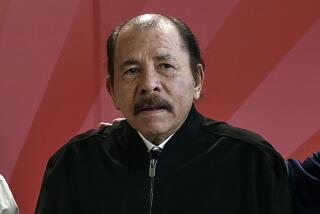Stop Rights Abuses, U.S. Tells Chile : Resolution Citing Torture, Killings Submitted to U.N.
- Share via
WASHINGTON — The Reagan Administration, in a draft resolution submitted to the U.N. Commission on Human Rights, has called on Chile’s authoritarian government to put a stop to killing, torture and other abuses by security forces and private death squads, U.S. officials said Wednesday.
The resolution complained that torture and other serious violations of human rights have continued despite a policy, announced by President Augusto Pinochet’s government last July, against both physical and psychological torture.
State Department spokesman Charles Redman said the Reagan Administration offered its own resolution in an effort to obtain a moderate text that Washington could support. He said the United States voted against earlier resolutions condemning Chile during previous annual meetings of the Commission on Human Rights because it considered the criticism of the Santiago regime to be “unbalanced and strident.”
‘Troubling Situation’
Redman said that in the past, the commission has attempted to hold Chile to a higher standard than it expects of many other countries, something that Washington considered unfair.
“This stand on a general principle has made it difficult for us to express in a clear manner . . . our deep concern over the troubling human rights situation in Chile,” Redman said.
Nevertheless, the Administration, which has been trying to encourage Pinochet’s dictatorial regime to share power with democratic opposition groups, was reluctant to continue voting against resolutions critical of well-documented Chilean human rights abuses.
The U.S. draft, offered last week to the commission’s annual meeting in Geneva by Richard Schifter, assistant secretary of state for human rights, called on the government in Chile to “immediately put an end to all forms of physical and psychological torture by the security and police forces.”
It complained of “the ineffectiveness of (Chilean) government and judicial authorities in preventing the recurrence of abuses by the security forces . . . (and) the failure of the government of Chile to ensure the thorough investigation and prosecution of the many recent unsolved cases of kidnaping and torture.”
Schifter told a press conference Wednesday in Geneva that the United States decided to sponsor the resolution because of Pinochet’s failure to respond to “quiet diplomacy,” United Press International reported.
“We go public when our quiet entreaties are not responded to,” he said.
Pinochet came to power after Marxist President Salvador Allende was killed in a 1973 right-wing coup that was widely believed to have Washington’s blessing.
U.S. policy toward Pinochet turned cool almost three years ago in one of the first shifts away from the Reagan Administration’s earlier belief that “authoritarian” right-wing governments are preferable to “totalitarian” left-wing ones.
President Reagan shocked Pinochet last year when he included Chile along with Paraguay, Cuba and Nicaragua as the exceptions to the trend toward democracy in Latin America.
U.N. Visit Welcomed
The U.S. draft resolution, which will be open to amendments by other nations represented on the commission, describes as a “positive development” the Chilean government’s decision to permit a special U.N. representative to visit the country to report on the human rights situation there.
But the resolution expresses shock at the envoy’s report of “the climate of insecurity for those involved in church and human rights work, the prohibition preventing several thousand Chilean exiles from returning to their country and the suppression of fundamental political rights and freedoms.”
The resolution called on Chile to “proceed vigorously to end the activities of groups and bands, whether private or connected with security forces, which have been reported to be responsible for kidnapings, interrogations, intimidation and beatings of ordinary citizens, and punish those responsible, especially the leaders of these groups.”
It also urged the government to “punish persons found to have been guilty of terrorist acts, under due process of law, without using the problem of terrorism as a justification for any abuse of authority against persons engaged in nonviolent opposition.”
In addition, the draft called on the Santiago regime to end its practice of banishing dissidents to remote parts of the country and to permit “the return of all Chilean citizens now living abroad who wish to return.”
More to Read
Sign up for Essential California
The most important California stories and recommendations in your inbox every morning.
You may occasionally receive promotional content from the Los Angeles Times.










